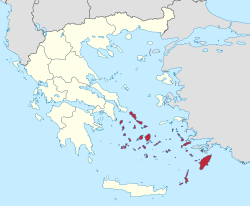| South Aegean Περιφέρεια Νοτίου Αιγαίου | |
|---|---|
| Administrative region | |
 Flag Flag | |
 | |
| Coordinates: 36°48′N 26°12′E / 36.8°N 26.2°E / 36.8; 26.2 | |
| Country | |
| Decentralized Administration | Aegean |
| Capital | Ermoupoli |
| Largest city | Rhodes |
| Regional units | List |
| Government | |
| • Regional governor | Giorgos Hatzimarkos (New Democracy) |
| Area | |
| • Total | 5,286 km (2,041 sq mi) |
| Population | |
| • Total | 327,820 |
| • Density | 62/km (160/sq mi) |
| GDP | |
| • Total | €5.976 billion (2021) |
| Time zone | UTC+2 (EET) |
| • Summer (DST) | UTC+3 (EEST) |
| ISO 3166 code | GR-L |
| HDI (2022) | 0.870 very high · 10th of 13 |
| Website | www |

The South Aegean (Greek: Περιφέρεια Νοτίου Αιγαίου, romanized: Periféria Notíou Eyéou, [periˈferia noˈtiu eˈʝeu]) is one of the thirteen administrative regions of Greece. It consists of the Cyclades and Dodecanese island groups in the central and southeastern Aegean Sea.
Administration
The South Aegean region was established in the 1987 administrative reform. With the 2010 Kallikratis plan, its powers and authority were redefined and extended. Along with the North Aegean region, it is supervised by the Decentralized Administration of the Aegean based at Piraeus. The capital of the region is situated in Ermoupoli on the island of Syros. The administrative region includes 50 inhabited islands, including the popular tourism destinations of Mykonos, Santorini and Rhodes.
Until the Kallikratis reform, the region consisted of the two prefectures of the Cyclades (capital: Ermoupoli) and the Dodecanese (capital: Rhodes). Since 1 January 2011 it is divided into 13 regional units, formed around major islands:
- Andros
- Kalymnos
- Karpathos-Kasos
- Kea-Kythnos
- Kos
- Milos
- Mykonos
- Naxos
- Paros
- Rhodes
- Syros
- Thira (Santorini)
- Tinos
Major communities
- Andros (Άνδρος)
- Ialysós (Ιαλυσός)
- Kallithéa (Καλλιθέα)
- Kálymnos (Κάλυμνος)
- Kárpathos (Κάρπαθος)
- Kos (Κως)
- Léros (Λέρος)
- Milos (Μήλος)
- Mýkonos (Μύκονος)
- Náxos (Νάξος)
- Páros (Πάρος)
- Petaloúdes (Πεταλούδες)
- Ródos (Ρόδος) (Rhodes in English)
- Santoríni (Σαντορίνη) or Thíra (Θήρα)
- Syros (Σύρου) including Ermoúpoli (Ερμούπολη)
Demographics
The region was one in only two in Greece to grow in population between 2011 and 2021 along with Crete, adding a total of 15,527 people (increase of 5%). It overtook Epirus and is presently the 9th largest region by population in Greece.
Economy
The Gross domestic product (GDP) of the province was 6.4 billion € in 2018, accounting for 3.5% of Greek economic output. GDP per capita adjusted for purchasing power was 22,400 € or 74% of the EU27 average in the same year. The GDP per employee was 79% of the EU average. South Aegean is the region in Greece with the second highest GDP per capita.
References
- ^ "Census 2021 GR" (PDF) (Press release). Hellenic Statistical Authority. 2022-07-19. Retrieved 2022-09-12.
- "Population on 1 January by age, sex and NUTS 2 region", www.ec.europa.eu
- "Sub-national HDI - Area Database". Global Data Lab. Retrieved 2021-07-20.
- ""The South Aegean Islands has been recognized as the European Region of Gastronomy for 2019"". The Business Report. Retrieved 17 April 2018.
- "ΦΕΚ A 87/2010, Kallikratis reform law text" (in Greek). Government Gazette.
- "Regional GDP per capita ranged from 30% to 263% of the EU average in 2018". Eurostat.
External links
- Official website
 (in Greek)
(in Greek)
| Administrative division of the South Aegean Region | ||
|---|---|---|
| Regional unit of Andros |  | |
| Regional unit of Kalymnos | ||
| Regional unit of Karpathos-Kasos | ||
| Regional unit of Kea-Kythnos | ||
| Regional unit of Kos | ||
| Regional unit of Milos | ||
| Regional unit of Mykonos | ||
| Regional unit of Naxos | ||
| Regional unit of Paros | ||
| Regional unit of Rhodes | ||
| Regional unit of Syros | ||
| Regional unit of Thira | ||
| Regional unit of Tinos | ||
| ||
| Regions of Greece | ||
|---|---|---|
| Regions | ||
| Autonomous regions | ||